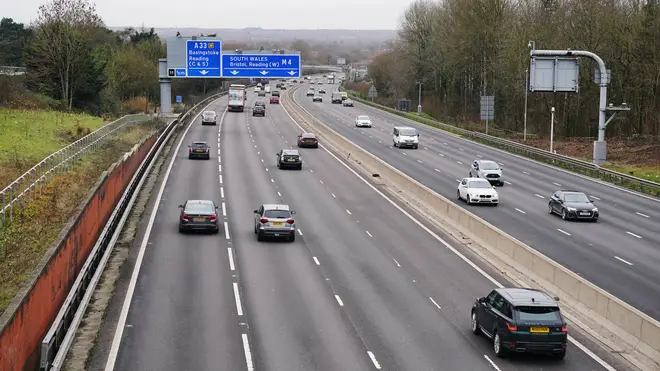
Oli Dugmore 4am - 7am
22 April 2024, 11:34

There have been hundreds of incidents when safety equipment was out of action in recent years, figures obtained by BBC Panorama show.
Technology aimed at keeping drivers safe on smart motorways frequently stops working, an investigation has found.
There have been hundreds of incidents when safety equipment was out of action in recent years, figures obtained by BBC Panorama show.
AA president Edmund King said these failures are “every driver’s worst nightmare” as he called for hard shoulders to be reinstated on all smart motorways where they have been removed.
National Highways insists evidence shows all types of smart motorways are safer than conventional motorways in terms of deaths or serious injuries, and a series of safety improvements have been made since 2021.
Some 193 miles of all-lane running (ALR) smart motorways – which use the hard shoulder as a permanent live traffic lane – were built in England to increase capacity at a lower cost than widening roads.
There have been long-standing safety concerns after fatal incidents in which vehicles stopped in live lanes were hit from behind.
Camera and radar systems have been deployed in an attempt to spot stranded vehicles, but figures obtained by Panorama in response to a Freedom of Information request show there were 397 incidents of power outages on smart motorways between June 2022 and February 2024.
Examples of safety technology being cut off for several days include:
– No signs, signals, camera or radar at Junction 18 on the M6 for five days in July 2023;
– No signs, signals or CCTV at Junction 22 on the M62 for five days in September 2023;
– No signs, signals, sensors or CCTV at Junction 6 on the M5 for three days in December 2023.
The longest power failure was at Junction 14 on the M4, where there were no signals or sensors for 11 days.
There were 174 power outages in the six months to February 2024 – the most recent period covered by the figures – which is equivalent to nearly one every day.
Mr King said: “We have been exposing the dangers of smart motorways for more than a decade and have made representations to more than a dozen transport secretaries and ministers.
“Four-fifths of our members tell us that they want smart motorways scrapped and the hard shoulder reinstated.
“Now is the time to stop this failed experiment. Efforts have been made to retrofit safety at great expense, but you can never fully correct such a flawed design.
“We are calling on all political parties to abolish smart motorways.
“The Panorama investigation questions what happens when the technology fails, which is every driver’s worst nightmare.”
National Highways operational control director Andrew Page-Dove said: “Safety is our highest priority and our motorways are statistically some of the safest in the world, but there is still work to do as every death is a tragedy and every serious injury a life changed.
“We need to help everyone feel confident when using smart motorways.
“They were introduced to provide extra capacity on some of our busiest and most congested sections of motorway, and the latest data shows that, overall, in terms of serious or fatal casualties, smart motorways are our safest roads.
“We are taking action to close the gap between how drivers feel and what the safety statistics show by increasing the number of emergency areas, delivering education campaigns, and improving the resilience of our operational technology systems.”
A National Highways report published in December last year revealed that smart motorways without a hard shoulder were three times more dangerous to break down on than those with an emergency lane.
The number of people killed or seriously injured after a stopped vehicle was hit by a moving vehicle was 0.21 per 100 million vehicle miles travelled on ALR smart motorways between 2017 and 2021.
That compares with 0.07 on controlled smart motorways, which have variable speed limits but retain a hard shoulder, and 0.10 on conventional motorways.
Prime Minister Rishi Sunak cancelled all future planned smart motorway projects in April last year, citing financial pressures and a lack of public confidence in the roads.